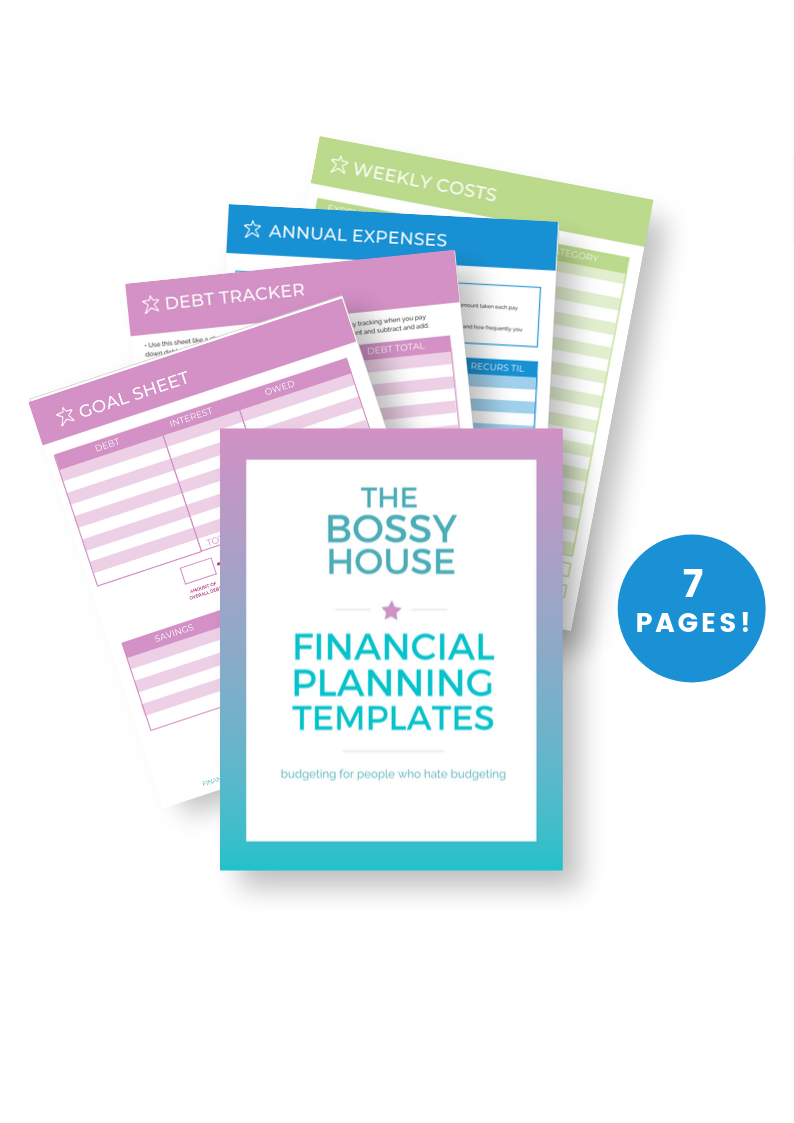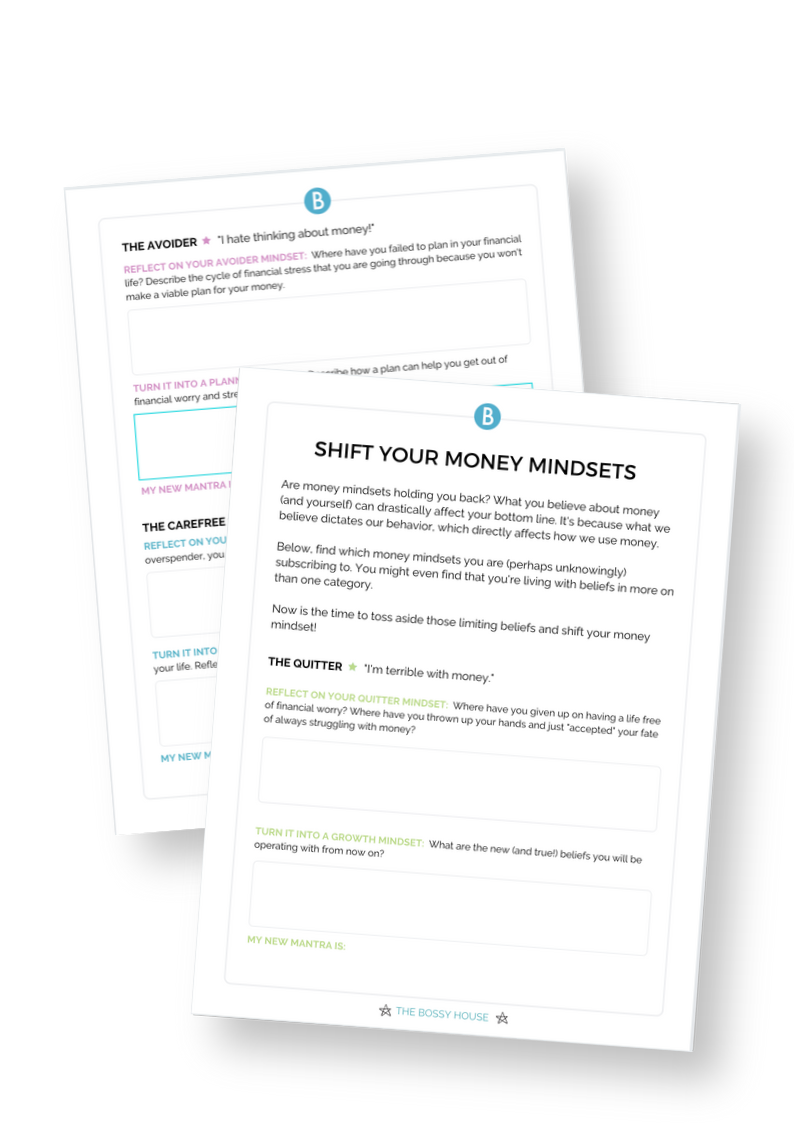
THIS POST MIGHT CONTAIN AFFILIATE LINKS. MY DISCLOSURE POLICY GIVES YOU MORE DETAILS.
It turns out, your brain is the main driver of your financial success. If you want to know how to change your mindset about money, you are in the right place!
If you’ve ever said “I’m terrible with money,” or “my finances are a mess,” or I can’t stop overspending,” or “we can just put it on the card!” then YOU, my friend, have a mindset issue.
These phrases represent four main types of money mindsets that could be holding you back. If you want to know how to change your mindset about money, read on to see how each of these phrases corresponds to a unique type of mindset that YOU CAN TOTALLY SHIFT!

How to change your mindset about money
If you want to know how to change your mindset about money, here’s the secret: you have to be open to deliberately shifting the way you think about money. This can help you make real financial change.
Our mindset affects our outlook on life, the way we spend or save money, how we feel about ourselves, and how we approach stresses in life.
If you want to change your mindset, you first have to identify the type of money mindset you are operating with. Once you identify you mindset, you can begin to deliberately pick a new mantra.
The Quitter
This mindset is characterized by avoidance. Quitters often think that there’s a secret set of knowledge they don’t possess around money, as if some folks are handed down this knowledge and others miss out on it.
If you ever find yourself saying, “I’m terrible with money,” you know that perhaps (if this is you) you have given up on ever being able to manage your finances with ease.
The consequences of this mindset are that you find yourself at the mercy of the mistakes that happen when you ignore your finances. Late charges, missed payments, or collections might plague you. You see these consequences as proof that you’re bad with money.
This is just not true. By quitting, you’ve given up on managing your finances but they are totally in control.
Changing the Quitter Mindset
You CAN manage your finances. It’s simply a skill to learn and YOU can learn it,.
It’s also true that sometimes, extreme penny pinchers are in this category. They’ve given up on understanding their finances, and they have no idea how much money they have to work with, so their solution is to just spend NO money.
Though admirable, this isn’t exactly what we’re looking for to manage our finances long term. Being able to save money or control spending is important, but the skill we are looking to develop is an ability to manage the big picture of your finances. If you’re avoiding that by penny pinching, you might be a quitter.
To shift this mindset, your mantra is “I can learn.”
You CAN learn how to manage your finances. You need to do some work, but you certainly can learn these basic skills. It takes time, energy, and stamina.
But if you have a growth mindset and push yourself to stay the course, you can do it. Perhaps you’ve never taken the time to learn these skills. That’s okay, it’s neer too late.
The Avoider
The next money mindset is that of the avoider.
Have you ever said “I hate thinking about money-- it’s too much work,” or “My finances are a mess.” This is the clear mantra of the avoider.
You may have resigned yourself to a messy financial life becuase you HATE facing your budget or your bank account.
People in this category often see their budget as a linear process instead of a system.
Do you find yourself seeing the bill pay process as reactionary, as in when the bill comes you pay it with the money you have in the account? That kind of system is so time consuming because it requires you to see every bill individually and every month.
Avoiders hate the work that goes into budgeting and paying bills, so often the consequences are severe and related to avoidance. Late charges turn into collections, collections turn into liens against your account, every bill that you pay attention to seems to be a shut off notice or an emergency, and you get the sense that paying attention to your finances is just about putting out fires. You’re not alone: Americans paid $34 billion dollars in overdraft fees last year.
Changing the Avoider Mindset
You need to know that you can learn how to change your money mindset and face the truth of your finances. By doing that consistently, you can actually change from an avoider to a planner.
When you make a big picture plan, you are equipped to deal with the monthly work of money management, and you’re able to face the truth and avoid the bad consequences.
Your mantra is “I can make a plan.”
A plan based on your goals, with the big picture of your financial truth in mind is the key to managing your money like a boss and getting out of the cycle fo stress that you’re in be cause you avoid your account like the plague.
My system helps avoiders by creating an automated system that you don’t have to manage too closely. Once you create it with some good financial decisions, you’re set. You just have to do some light monitoring.
Some avoiders spend their money and have no idea how much they have to work with. The bonus of this plan is that it sets up your spending account with JUST ENOUGH money that you need. So without a lot of work you avoid overspending and ytou don’t have to track your expenses or keep an eye on your budget.
The Carefree Spender
If you’re a carefree spender, you usually know it.
Folks who struggle with overspending suffer the consequences of always feeling broke.
They also frequently buy things that they later report not really valuing.
The cycle of using the credit card to purchase luxury items, not being able to pay the cards every month, and racking up debt is familiar to a spender.
If you’ve ever said “I can’t stop spending money,” you know who you are.
Changing the Spender Mindset
You need to adopt a realist mindset, one that begins to identify what exactly it is that makes you happy and is worth money to you.
The realist mantra is “There is enough money for what I really want.”
You will need to do some good work identifying what your values are and how you want to spend money so that you can truly stop buying things that don’t matter to you.
If you have this spending mindset, it would be great for you to get into an abundance mindset, truly believing that you can be happy with what you have and that there is enough money in your life for the things you want and need.
Part of this is appreciating what you have and truly valuing the things that you purchase.
For spenders, I recommend setting aside a small portion of your monthly salary to donate or give to those in need. Not only is it good for the world, but it helps you understand that there is enough left over for you to give to others. It takes the focus off of you and the feeling you have that there might not be enough.
The Denier
Finally, the last money mindset is the denier.
You’re the denier if you feel like you don’t have enough money to live your life or meet your goals.
If you’re putting things on the card (your mantra is “let’s put it on the card!”) then you are probably in denial.
Similar to the Avoider, the Denier doesn’t want to know the consequences of their choices, and is delaying the consequences of their overspending by putting things on the card.
In this and other ways, Deniers are unaware of their true cost of living because they spend what they have. They frequently don’t save for emergencies or annual bills, so deniers are often derailed by big bills that come in that they weren’t expecting.
I like to call the surprise Deniers experience as “fake surprise” because there is no way they should be surprised since they know they have to pay their taxes or whatever every year.
Changing the Denier Mindset
Deniers deliberately deny reality. So your mantra is: "I can handle it."
Meaning, I can handle looking at the truth, at my account, and at my circumstances.
Trust that you will figure it out, that there can be a solid plan you create to avoid the chaos of your finances the way they are now.
You can really look at your situation and create a plan that works for you.
How to change your mindset about money when money is tight

Now it might be true that you don’t have enough money to live on.
But if that’s the case, it’s time to get real with yourself, get honest, and figure out the true cost of living so you can see where you have to cut to afford your life and live with integrity.
I don’t want to suggest that everyone can afford their life, pay bills easily, and enjoy the finer things in life. Financial hardships are out there and you may be experiencing them.
However, there is no other way forward but to take charge.
You have to take charge to make any change.
So even if you make NO money, have struggled mightily with your finances, it makes sense to take charge now, get honest with your situation, and move forward with the full truth of your situation at the foundation of your plan.
Money Mindsets: I walk you through it
This video walks you through the money mindset issues you may have and helps you think about how to change your mindset about money today!
As you watch the video, follow along with my handy worksheet that helps you identify your own personal money mindset issues.
This worksheet will help you identify which of the mindsets you are operating with, and clarify for you what your next steps are to shift your mindset!
Then make a plan!
You need a financial plan that helps you see the big picture, sets you up to afford your life and make your bill payments on time, and then automates it so you don’t have to think about it 24-7.
If you’re interested in the plan I use, you can get the spreadsheets now that help you set up your plan.
RELATED: The Bossy House Budgeting System
Once you shake off those useless mindsets about money that are keeping you stuck, you are free to create a fresh plan that helps you take charge of your money management and meet your financial goals!
Get this set of financial planning templates to get started on your budget journey!


